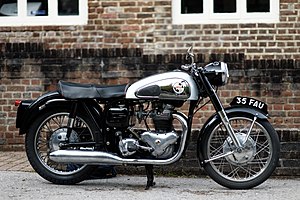Norton Motorcycle
 |
|
 |
|
| Industry | Motorcycles |
|---|---|
| Founded | 1898; relaunched 2008 |
| Headquarters | Donington Park, United Kingdom |
|
Key people
|
Stuart Garner |
| Website | www.nortonmotorcycles.com |
The Norton Motorcycle Company (formerly Norton Motors, Ltd.) is a British motorcycle marque, originally from Birmingham, UK. It was founded in 1898 as a manufacturer of "fittings and parts for the two-wheel trade". By 1902, the company began manufacturing motorcycles with bought-in engines. In 1908, a Norton-built engine was added to the range. This began a long series of production of single and eventually twin-cylinder motorcycles, and a long history of racing involvement.
Production of the military Model 16 H and Big 4 sidevalve motorcycles was Norton's contribution to the WWII war effort, almost 100,000 being manufactured.
When major shareholders started to leave Norton in 1953, the company declined and Associated Motor Cycles bought the shares. Although motorcycle sales went through a recession in the 1950s, and Norton Motors Ltd was only a small manufacturer, Norton sales flourished. A series of Norton Dominator Twins of 500 cc, then 600 cc, then 650 cc and then the 750 cc Norton Atlas kept sales buoyant, especially with sales to the USA.
In 1968, the new 750 cc Norton Commando Model appeared, with the engine/gearbox/swingarm unit isolastically insulated from the frame with a series of rubber mountings. This kept the vibrations from the rider, giving a smooth comfortable ride. The Commando was a best seller, and voted #1 Motorcycle of the Year a number of times in Britain. 850 cc models appeared for 1973, giving more torque. For 1975 an electric start arrived in the 850 Mk3.
The largest UK motorcycle manufacturer at the time was BSA-Triumph, comprising Birmingham Small Arms Company in Birmingham, and Triumph Motorcycles in Meriden. BSA-Triumph faced difficulties caused by poor management, outdated union practices, old-fashioned motorcycle designs and antiquated factory conditions. A merger with Norton Motorcycles was proposed; but although Dennis Poore's Norton Motorcycles was by far the smaller partner, Poore effectively secured a take-over of BSA-Triumph, forming Norton Villiers Triumph (NVT). The Triumph factory Meriden was the least modern; but workers engaged in a "sit-in", forming a workers' co-operative. Poore was CEO of Manganese Bronze Holdings, a company apparently more concerned with asset stripping than with motorcycle production. Subsequent political manoeuvrings led to the downfall of NVT, as taxpayer-assisted wranglings over amalgamations and sell-offs all but killed the once extensive UK motorcycle industry.
...
Wikipedia
